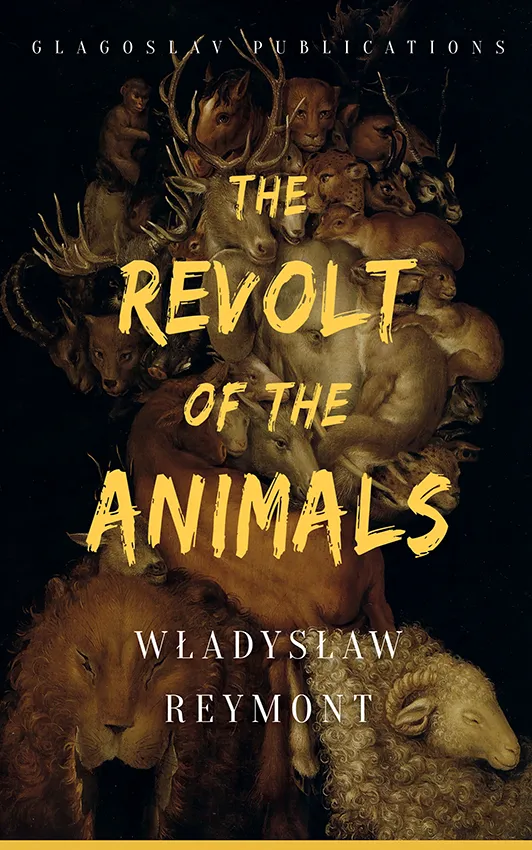The Revolt of the Animals
Price range: €9.95 through €27.99
Author: Władysław Reymont
Translator: Charles S. Kraszewski
Narrated by: Mark Royse
This animal fable of the Polish Nobel Prize winner (1924) was inspired by the Bolshevik Revolution in Russia, and the Polish-Soviet War, which had just ended a year before the novel was serialised in 1922. Comparisons to George Orwell’s later novel Animal Farm will naturally arise in the reader’s mind – and often, to the advantage of Reymont.
“Don’t give up! I’ll help you!” barks Rex, the hero of Władysław Reymont’s Revolt of the Animals (1924), “carried away with wrath and compassion” at the sight of his friend the old donkey with “his head covered in a hempen sack, being whipped by boys harrying him towards a pit of lime.”
Who would not be roused to a righteous indignation at the sight of such wanton cruelty, inflicted upon a wise, sentient creature – for the perverse pleasure of man, that “crown and lord of all creation,” to whom dominion over this world was supposedly given by the Lord at the dawn of creation? Certainly, the beasts of farmyard and field know better than anyone how gentle a master human beings can be, and so it is no surprise when this scene becomes the last straw for our patient, long-suffering quadruped cousins. “Take everyone with you,” says Blackie, who – like most of the other animals on the farm, had remained impervious, up till now, to Rex’s urgings to revolt – “everybody’s suffering the same misery, whips, and slavery. It’s eating away at us all.”
Thus begins the animal fable of the Polish Nobel Prize winner (1924), inspired by the Bolshevik Revolution in Russia, and the Polish-Soviet War, which had just ended a year before the novel was serialised in 1922. Banned in Poland during the Communist years and only republished in this century, The Revolt of the Animals is now made available to the English readership for the first time in the translation of Charles S. Kraszewski. Comparisons to George Orwell’s later novel Animal Farm will naturally arise in the reader’s mind – and often, to the advantage of Reymont.

| Dimensions | 152 × 229 mm |
|---|---|
| Author | Władysław Reymont |
| Pages | 280 pages |
| Book Format | Hardcover, Paperback, EPUB, Kindle |
| Publication date | 29th November 2022 |
Author
Władysław Reymont
Translator
Charles S. Kraszewski (born 1962) is the author of three volumes of original poetry, as well as numerous translations from Polish and Czech, including classics such as Adam Mickiewicz’s Dziady (Forefathers’ Eve) and experimental poets of the modern period like Tytus Czyżewski A Burglar of the Better Sort: Poems, Dramatic Works, and Theoretical Writings, both published by Glagoslav.
Endorsements and Review Quotes
“Translator Charles Kraszewski has skillfully brought this complicated and unusual tale into English, giving Anglophone readers access to a work of Polish speculative fiction they wouldn’t otherwise have. […] Both Kraszewski’s translation and introduction are valuable texts.” Rachel Cordasco, The Polish Review
“The Revolt of the Animals follows on the Russian Revolution and the Polish-Soviet War of 1919-1921. The novel was apparently long suppressed for being critical of Communism, but Reymont’s allegory is a more complex and problematic one. Rex is dictatorial and brutal, and arguably his quest is doomed to failure: the promised land is always just out of reach, and so, for all intents and purposes, illusory.” M.A.Orthofer, the complete review
“Known in Polish simply as The Revolt (Bunt), it tells the story of mistreated farm animals who succeed in overthrowing their owners, only to watch their would-be socialist revolution devolve into disillusionment and chaos. […] In any event it is the charm of the language and the strange idyll that it conjures up, rather than the events described, that makes Reymont worthwhile today.” Benjamin Paloff, The Times Literary Supplement
“The novel is often compared to Orwell’s Animal Farm, in being a parable of how ideals can so easily be corrupted and how quickly the oppressed can turn into the oppressors. […] It is a compelling narrative, horrific in its depiction of animal suffering. The writing is overblown at times, and the journey repetitive as disaster follows disaster, but overall, it’s a complex and thought-provoking read.” Mandy Jenkinson, Historical Novel Society






